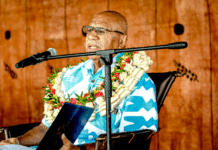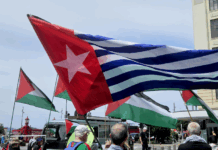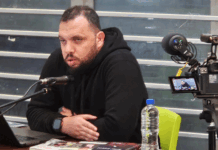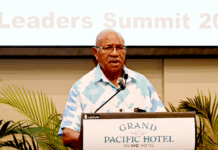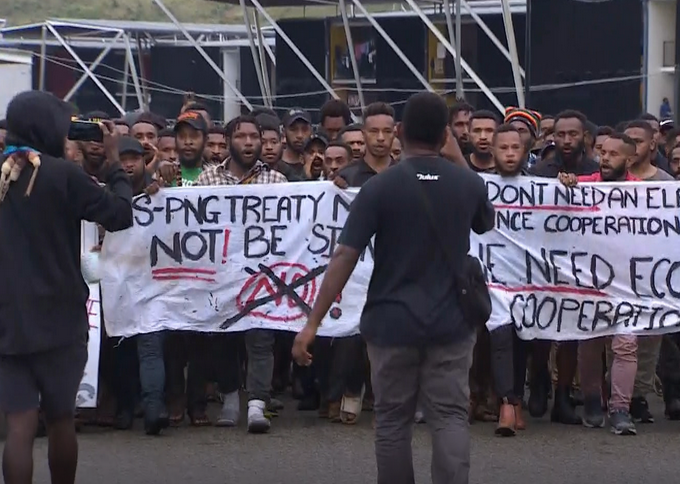
ANALYSIS: By Barbara Dreaver in Port Moresby
When I was growing up in Kiribati, then known as the Gilbert Islands, New Zealand divers came to safely detonate unexploded munitions from World War II.
Decades on from when US Marines fought and won the Battle of Tarawa against Japan, war was still very much a part of everyday life.
Our school bell was a bombshell. We’d find bullet casings.
- READ MORE: UPNG student protesters call for ‘transparency’ over US defence pact
- There must be clarity’ – PNG students protest over US defence deal
- Security pact: PNG expects more US military boots on ground
- Pacific leaders arrive in Port Moresby ahead of Modi and Blinken PNG visit
- OPM calls on global trade unions to blacklist Indonesian goods, services
- Other US defence pact reports
In fact, my grandmother’s leg was badly injured when she lit a fire on the beach, and an unexploded ordnance went off. There are Japanese bunkers and US machine gun mounts along the Betio shoreline, and bones are still being found — even today.
Stories are told . . . so many people died . . . these things are not forgotten.
That’s why the security and defence pacts being drawn up around the Pacific are worrying much of the region, as the US and Australia partner up to counter China’s growing influence.
You only have to read Australia’s Defence Strategic Review 2023 to see they are preparing for conflict.
The battle is climate change which is impacting their everyday life. The bigger powers will most certainly go through the motions of at least hearing their voices.
— Barbara Dreaver
Secret pact changed landscape
While in the last few years we have seen China put big money into the Pacific, it was primarily about diplomatic weight and ensuring Taiwan wasn’t recognised. But the secret security pact with the Solomon Islands changed the landscape dramatically.
There was a point where it stopped being about just aid and influence — and openly started to become much more serious.
Since then, the escalation has been rapid as the US and Australia have amped up their activities — and other state actors have as well.
In some cases, lobbying and negotiating have been covertly aggressive. Many Pacific countries are concerned about the militarisation of the region — and whether we like it or not, that’s where it’s headed.
Tuvalu’s Foreign Minister Simon Kofe said he understands why his country, which sits between Hawai’i and Australia, is of strategic interest to the superpowers.
Worried about militarisation, he admits they are coming under pressure from all sides — not just China but the West as well.
“In World War II, the war came to the Pacific even though we played no part at all in the conflict, and we became victims of a war that was not of our making,” he said.
Important Pacific doesn’t forget
“So it’s important for the Pacific not to forget that experience now we are seeing things that are happening in this part of the world, and it’s best we are prepared for that situation.”
Academic Dr Anna Powles, a long-time Pacific specialist, said she was very concerned at the situation, which was a “slippery slope” to militarisation.
She said Pacific capitals were being flooded with officials from around the region and from further afield who want to engage.
Pacific priorities are being undermined, and there is a growing disconnect in the region between national interest and the interest of the political elites.
Today in Papua New Guinea, we see first-hand how we are on the cusp of change.
They include big meetings spearheaded by the US Secretary of State Antony Blinken, another one by India’s Prime Minister Narendra Modi and a defence deal that will allow US military access through ports and airports. In exchange, the US is providing an extra US$45 million (NZ$72 million) in funding a raft of initiatives, some of which include battling the effects of climate change.
Equipment boost
The PNG Defence Force is also getting an equipment boost, and there’s a focus on combatting law and order issues — which domestically is a big challenge — and protecting communities, particularly women, from violence.
There is much in these initiatives that the PNG government and the people here will find attractive. It may well be the balance between PNG’s national interest and US ambitions is met — it will be interesting to see if other Pacific leaders agree.
Because some Pacific leaders are happy to be courted and enjoy being at the centre of global attention (and we know who you are), others are determined to do the best for their people. The fight for them is not geopolitical, and it’s on the land they live on.
The battle is climate change which is impacting their everyday life. The bigger powers will most certainly go through the motions of at least hearing their voices.
What that will translate to remains to be seen.
Barbara Dreaver is TV1’s Pacific correspondent and is in Papua New Guinea with the New Zealand delegation. Republished with permission.






